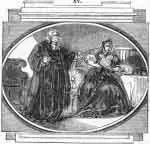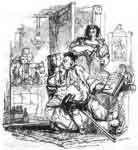A new Widow is lamenting the loss when a suitor approaches. There is much hand wringing about what to do but temptation wins out.
Weak judgment falls before temptation,

Northcote
Clarissa, sprightly once and gay,
Now sigh’d the tedious hours away:
She mourn’d the kindest husband gone,
The husband much—but more the man.
Dark weeds conceal’d the fair from view,
Yet mightily became her too!
She veil’d hrr pretty blubber’d face,
And wept her dear with such a grace!
But, lo! young Florimel appears
To dry the joyless Widow’s tears:
His suit she heard with warm disdain,
Protested all his hopes were vain;
Her hands she wrung, her robes she rent,
And wept, and ‘wonder’d what he meant!’
Yet through the drop that drown’d her eye,
‘Tis said, there shone a spark of joy;
And sage diviners could foretel,
That Florimel might yet do well.
A scruple now disturb’d her head,
Whether it were a sin to wed?
Queries and doubts her brain possest,
And busy conscience broke her rest.
So, to resolve this knotty case,
She seeks the Curate of the place;
A casuist!—deep: of judgment!—sound:
Yes, fam’d for parts—the parish round.
Clarissa, with the rising sun,
Approach’d her friend, and thus begun:
‘Full sixty times hath yonder light
‘Arose—as oft has sunk to night—
‘Since the lamented hour that gave
‘My faithful consort to the grave:
‘And sure no second love shall e’er
‘Efface that image, still so dear:
‘Clarissa, to his memory just,
‘Forever shall revere his dust!
‘Yet cruel prudence may require
‘What else were foreign to desire;
‘And, ‘midst a weight of cares, you know,
‘What can a helpless woman do?
‘My heedless servants slight my call—
‘My tenants break—my houses fall—
‘And Florimel, with winning air,
‘Tells me they want a husband’s care:
‘What does my learned Doctor say?’
‘Why, marry sure, without delay.’
‘But, should the lover prove unkind,
‘A tyrant o’er a tender mind;
‘How hard my lot, condemn’d to mingle
‘Tears with my cup!’—’Why then live single.’
‘Yet, what if an obdurate fair
‘Should drive a lover to despair?
‘You know the foolish freaks of men;
‘I dread the thought!’—’Nay, take him then.’
‘But should be squander my estate,
‘And pawn my jewels, rings, and plate!
‘And witless I, by folly led,
‘Be turn’d adrift to beg my bread!’
The Doctor, vers’d in woman-kind,
Perceiv’d the working of her mind:
‘Madam,’ he cries, ‘when truth we seek,
‘All argument is often weak;
‘When reasons weigh on either part,
‘Opinion vainly tries her art;
‘So still descending truth prevails,
‘She sits suspended o’er the scales.
‘A way more speedy shall be tried;
‘A tongue shall speak that never lied:
‘Know, Madam, then, my parish bell
‘Is famous for advising well;
‘Whate’er the point in question be,
‘It hits the matter to a T.
‘Thus as it dictates by its tone,
‘You sure must wed, or lie alone.’
Now tow‘rd the church in haste they go,
The Widow cheerful—but so so!—
Yet vows, what’er the answer giv’n,
She ‘piously will yield to heav’n.’
The Doctor too exhorts the fair
To listen, and decide with care:
And now the mystery to unfold,
He turn’d the key, the bell he toll’d.
The Widow mus’d and knit her brow,
‘Well, Madam, pray what think you now?’
(Here, first she sobb’d, and wip’d her eye,
Then labour’d out a doleful sigh;)
‘Think, Doctor?—Why, the case is plain:
‘Alas! I find resistance vain!
‘In heav’n, ’tis said, our doom is seal’d:
‘Ah, Florimel! and must I yield;
‘Yet not by choice—by fate I’m won,
‘The will of heav’n be ever done!
‘The bell ordains thee to my bed;
‘For, bark! it loudly bids me /wed/.
‘Dear Doctor then, (I speak with sorrow,)
‘Be sure you be at home to-morrow.’
Application
Think you the simple tale too long,
Then hear the moral of my song:
The moral to no sex confin’d,
Regards alike all human kind.
Sly passion and distemper’d sense
Usurp the form of evidence:
And truth or falsehood, good or ill,
Receive their tincture from the will,
Man boasts his reas’ning pow’r in vain;
The pageant drags a hidden chain:
A varied shape each object wears,
Just as he wishes, hopes, or fears;
His deepest thought (his vaunted rule)
Is passion’s slave, or folly’s fool.
‘Tis hence we blindly can approve
The very faults of those we love:
‘Tis hence we blindly can debate
The noblest deeds of those we hate.
Abroad thus works perverted will,
At home our views are darker still :
And actions, deem’d absurd in thee,—
Are prudent, wise, and just in me:
By the vain colour of a name,
We sink at once the guilt and shame,
The prodigal is generous, free;
The miser boasts economy:
Gay, the debauch’d; the proud is great;
The bold oppressor hates a cheat:
The fawning slave obliges all:
And mad revenge is honour’s call.
Thus passion shoots thro’ every part;
The brain is tainted by the heart:
Weak judgment falls before temptation,
“And reason is but inclination.”

